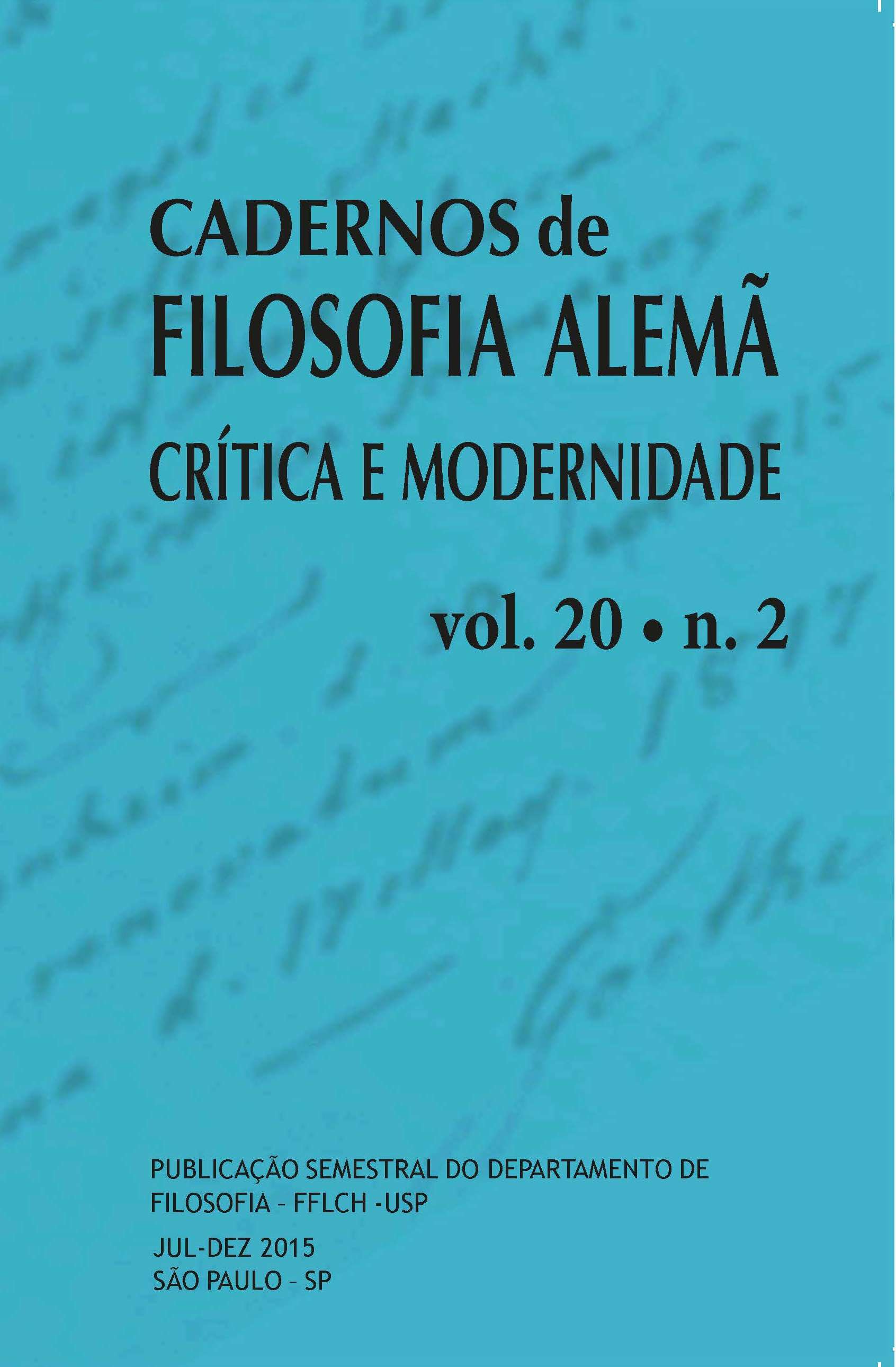By the way of the notion of “character”: the presences of Kant and Schelling in the doctoral thesis of Schopenhauer
DOI:
https://doi.org/10.11606/issn.2318-9800.v20i2p67-85Keywords:
Schopenhauer, intelligible character, empirical character, Kant, Schelling.Abstract
This paper intends to show as the use carried out by Schopenhauer of the notions of intelligible character and of empirical character in On the fourfold root of the principle of sufficient reason may illustrate the nature of his first reception of Kant and of Schelling.
Downloads
References
BARBERA, S. Schopenhauer und Schelling. Aufzeichnungen über den Begriff der Entzweiung des Willens. In: CIRACÌ, F.; FAZIO, D. M.; KOSSLER, M. (Hrsg.). Schopenhauer und die Schopenhauer-Schule. Würzburg: Königshausen & Neumann, 2009, pp.73-88.
BARBOZA, J. Infinitude subjetiva e estética: natureza e arte em Schelling e Schopenhauer. São Paulo: Unesp, 2005.
CACCIOLA, M. L. Schopenhauer e a questão do dogmatismo. São Paulo: Edusp, 1994.
HÜHN, L. Die intelligible Tat. Zu einer Gemeinsamkeit Schellings und Schopenhauers. In: IBER, C.; POCAI, R. (Hrsg.). Selbstbesinnung der philosophischen Moderne. Beiträge zur kritischen Hemeneutik ihrer Grundbegriffe. Würzburg: Königshausen & Neumann, 1998, pp.55-94.
KANT, I. Kants Gesammelte Schriften. Preussischen Akademie der Wiessenschaften. Berlin: Walter de Gruyter. Bd. I-IX, 1902-1923.
___________.Crítica da razão pura. 3ª ed. Trad. Fernando Costa Mattos. Petrópolis: Vozes; Bragança Paulista: Ed. São Francisco, 2013.
KOSSLER, M. Empirischer und intelligibler Charakter. Von Kant über Fries und Schelling zu Schopenhauer. Schopenhauer Jahrbuch, Würzburg, Bd. 76, 1995, pp.195-201.
SCHELLING, F. W. J. A essência da liberdade humana: Investigações filosóficas sobre a essência da liberdade humana e das questões conexas. Tradução de Márcia de Sá Cavalcante. Petrópolis: Vozes, 1991.
SCHOPENHAUER, A. Sämtliche Werke. Edição hitórico-crítica de Paul Deussen. 16 Bd. München: Piper Verlag, 1911-1941. In: “Schopenhauer im Kontext III” - Werke, Vorlesungen, Nachlass und Briefwechsel auf CD-ROM (Release 1/2008).
___________. Über die vierfache Wurzel des Satzes vom zureichenden Grunde. Auflagen I und II. Bd. III. In: Sämtliche Werke. München: Piper Verlag, 1911-1941.
___________. Über die Freiheit des Willens. In: Sämtliche Werke. Bd. III. München: Piper Verlag, 1911-1941.
___________. Der Handschriftliche Nachlass. In: Sämtliche Werke. Bd. XI. München: Piper Verlag, 1911-1941.
___________. Sobre o fundamento da moral. Tradução de Maria Lúcia Cacciola. São Paulo: Martins Fontes, 2001.
___________. O mundo como vontade e como representação. Tomo I. Tradução de Jair Barboza. São Paulo: Unesp, 2005.
VECCHIOTTI, I. Schopenhauer e Schelling: problemi metodologici e problemi di contenuto. Schopenhauer Jahrbuch, Würzburg, Bd. 68, 1987, pp.82-108.
Downloads
Published
Issue
Section
License
Information and conceptions on the texts are complete responsibility of the authors.
All the articles submitted before July 5th 2018 and those published after July 2021 are licensed under a CC BY-NC-ND license – except those published between the aforementioned dates, which are under the CC BY-NC-SA license. The permission for the translation of the material published under the license CC BY-NC-ND by third parts can be obtained with the consent of the author.
Open access policies - Diadorim
Rules applied before July 5th 2018:
Presenting a submission to our Editorial Board implies granting priority of publication for “Cadernos de filosofia alemã”, as well as transferring the copyright of texts (once published), which will be reproduced only with the manifest authorization of the editors. Authors keep the right to reuse the texts published in future editions of their work, without paying any fees to "Cadernos”. We will not grant the permission to re-edit or translate the texts for third parts without agreement of the author.


